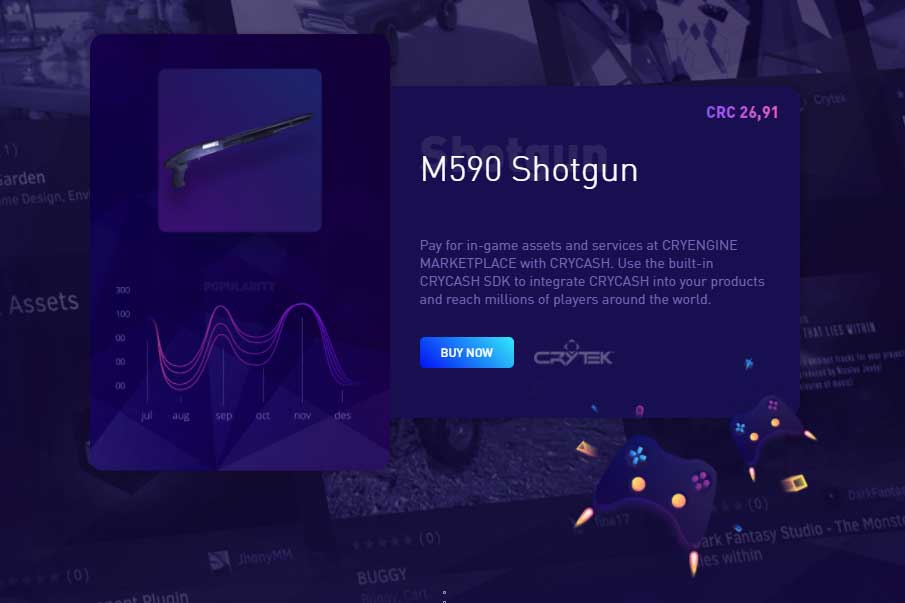 EMERGING TECH
EMERGING TECH
 EMERGING TECH
EMERGING TECH
 EMERGING TECH
EMERGING TECH
German video game developer Crytek GmbH announced Thursday that the company has teamed up with Crycash, a blockchain currency startup looking to make digital currency for gamers.
With this partnership, the two companies will take advantage of digital cryptocurrency to allow the purchase of games, advertising and customer rewards.
The gaming industry is replete with microtransactions and virtual currencies, especially massively multiplayer games and mobile games where users often earn versions of virtual “gold” or pay for tokens used to buy power-ups and costumes. It is not uncommon for games to sell virtual items for amounts under a dollar each.
The eponymous cryptocurrency is Crycash and because it is powered by blockchain technology, it can be traded on a tamper-proof distributed ledger. This means that the owners of the Crycash cryptocurrency actually control their accounts and can trade the currency into and out of the Crycash ecosystem, making it more valuable.
Crycash Chief Executive Wachtang Budagaschwili said Crycash consists of four major components: Plink, a communications app for gamers and Crycash wallet; an advertising platform; an eSports platform for gaming tournaments and other events; and a virtual asset marketplace.
With the Plink app, developed by Crycash, gamers can monetize their game time, socialize with other gamers, see what games friends are playing and earn Crycash tokens by completing game tasks set by developers. Plink also operates as a wallet to store earned tokens.
Plink also links gamers and developers as a marketing tool, allowing businesses to advertise to gamers and target them based on interests, game time, play style and other metrics. Putting Crycash tokens into the hands of gamers also provides a platform for developers and publishers to offer coupons, services and virtual items for the tokens, circling gamers back to the app.
“Our motto is creating products which let gamers and developers make more from their passion,” said Budagaschwili. “The Crycash ecosystem solves two problems at once: It gives gamers a way to monetize game time by completing in-game tasks, set by game developers, while providing developers with decentralized sales options for games and other virtual items.”
Another thing that cryptocurrencies do well is providing a tradable value to virtual items. Therefore, by connecting to Crytek’s Cryengine marketplace, developers and publishers will be able to use Crycash to buy in-game assets. For gamers, developers could make Crycash the de facto trade currency for virtual items, such as shotguns in a shooter, magic swords in a fantasy or hats and dresses in a social game.
Valve Corp.’s multiplayer shooter game Team Fortress 2 is best known for its “economy of hats,” where Valve made a large variety of in-game headwear. The hats and other items could be traded, dismantled and crafted, all with microtransactions. That produced such an economy that an analyst pegged the virtual item market cap around $50 million in 2011.
Crytek is the developer of a number of high-profile games, including free-to-play online multiplayer shooter Warface. Free-to-play games operate primarily on microtransactions and depend heavily on virtual currencies. As such, the free-to-play game market is extremely well fit for cryptocurrencies such as Crycash.
An interested party need only go to the My.com website for Warface to see that right on the front page is a virtual item – an in-game shotgun called the US-12. Items such as these could be purchased or traded between players with Crycash.
Crycash and Crytek are now part of a select few companies making inroads into a blockchain future for gaming. Social gaming platform developer FlowPlay Inc. recently announced its a blockchain cryptocurrency for its own games, similar to what Crycash is doing. Also, Jon “Neverdie” Jacobs, chief executive of Neverdie Studios, spoke to SiliconANGLE about Neverdie Coins and Teleport Tokens, a cryptocurrency solution for multiplayer gaming expected to help allow developers to provide virtual jobs to gamers.
Virtual marketplaces have also been proposed using blockchain technology including Switzerland-based BLOCKv, which would provide a generic virtual goods marketplace, and decentralized marketplace DMarket, designed for gamers to exchange virtual game items between games.
The Crycash development also comes as Valve’s game distribution platform Steam stopped accepting cryptocurrency bitcoin for payments. The company said it could no longer support bitcoin because of price volatility and high fees paid by users during transactions.
The startup intends to fund its ecosystem with an initial coin offering starting Dec. 12. An ICO is a crowdsale of tokens used by a platform with the intent to both bring funds in but also to build up a customer base for the platform’s ecosystem. The Crycash ICO will sell tokens for 0.001 Ether, the Ethereum blockchain cryptocurrency, or approximately 46 cents each.
Early buyers who join in during the first 120 hours of the ICO will receive a 15 percent bonus, though the bonus will fade by 1 percent every day until the evening of Dec. 31. The token sale will end Jan. 15, 2018.
Support our mission to keep content open and free by engaging with theCUBE community. Join theCUBE’s Alumni Trust Network, where technology leaders connect, share intelligence and create opportunities.
Founded by tech visionaries John Furrier and Dave Vellante, SiliconANGLE Media has built a dynamic ecosystem of industry-leading digital media brands that reach 15+ million elite tech professionals. Our new proprietary theCUBE AI Video Cloud is breaking ground in audience interaction, leveraging theCUBEai.com neural network to help technology companies make data-driven decisions and stay at the forefront of industry conversations.